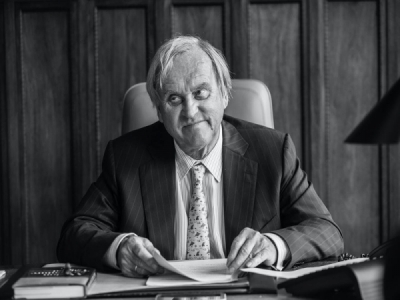
Posted on June 29, 2020
Obituary From FD, June 27, 2020
By Peter Lalkens
Translated from Dutch original
Rotterdam investor who came out of anonymity only late in life
Cees de Bruin on a photo from 2016
Cees de Bruin on a photo from 2016 Photo: Peter Boer / de Beeldunie
He knew former President George W. Bush Jr. personally and was one of the first to apply new financing techniques in the Netherlands. The prominent Rotterdam investor Cees de Bruin saw what others did not see and took full advantage of this in his career in high finance.
On Friday it was announced that De Bruin died at the age of 74. The founder and owner of the investment company Indofin had been struggling with health problems for some time.
Although De Bruin, who was born in Rotterdam in 1946, moved to the highest level of investors and private equity and was among the wealthiest Dutch, he did not radiate glamor or glitter. Far from it.
Nose for good deals
Ben Vree, former CEO of SmitInternationale, praised De Bruin for his ability to “look through companies”. Vree: “He was not only able to analyze well financially, but also to see what else you could do with a company.”
Hans ten Cate, until recently president of shipbuilder IHC, has known De Bruin since 1990. He called him “an eminent investor, but less of an entrepreneur”. In his view, De Bruin had “a nose for good deals”. He was also creative and an ‘extremely clever negotiator’.
The sense of investing appeared at an early age. De Bruin was still pursuing his economics studies at Erasmus University when he made his first investment in the “NV Maatschappij tot Exploitatie van de Westplaat Buitenvelden”. He founded Indofin in 1968. Only later would he expand this into an investment company with dozens of investments worldwide in shipbuilding, energy and offshore.
See what others don’t see
His first investment revealed all his ability to see opportunities that others didn’t yet see. This property was also useful to him when he saw an emerging type of corporate takeover financing in the US in the late 1970s: the leveraged buyout, financing with borrowed money.
After his studies, he first started working at shipbuilder IHC, before switching to the company of offshore entrepreneur Pieter Schelte Heerema in 1974. In the eyes of de Bruin, Heerema was “a brilliant entrepreneur” from whom he learned a lot. There he laid the foundation for his extensive international network. In addition, he participated privately in companies that Heerema took over.
At the same time, Heerema was someone with a controversial past because of his association with the Waffen SS. De Bruin said about this in the FD: “For myself, I have made a very clear distinction between what is a political opinion and what is business implementation. I never wanted to have anything to do with that political opinion.” In addition, Heerema had repented in his eyes.
However, his investments were not all successful. One of Indofin’s major investments, in shipbuilder IHC, ended in fiasco in April this year, when the group had to be rescued by the state and an industry consortium.
To do something in return
For the outside world, De Bruin’s longing for privacy was for a long time a kind of enigma, an investor with a certain mystique. That was reinforced by his friendly, but also somewhat angular way of doing things. His words could not always keep up with his thinking, which often resulted in unfinished sentences.
In the past ten years, De Bruin, who liked to collect art, appeared more on the Rotterdam social scene. He wanted to give something back to the city that was close to his heart. In the 2012 Van Beuningen lecture, he argued for greater involvement of entrepreneurs in the city.
He supported the prestigious Rotterdam horse competition CHIO. Jan de Mooij, former director of the CHIO: “De Bruin thought it was important that the CHIO had broad social support.” De Mooij describes him as ‘very smart and quite introverted.’
Until his resignation last December, De Bruin, as chairman of the stadium of Feijenoord Stadium, showed himself to be a champion of the construction of a new stadium for Feyenoord. “He was one of the drivers in this,” said Commissioner Pieter van Oord.
De Bruin showed his patriarchal side at the shareholders’ meetings of Stadion Feijenoord. He rigorously cut off troublesome shareholders if, in his view, they showed too little respect. He will not be able to experience the construction of the stadium.





